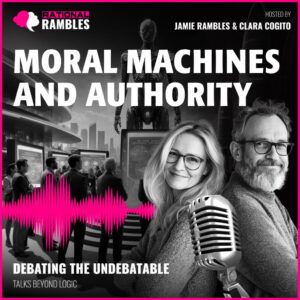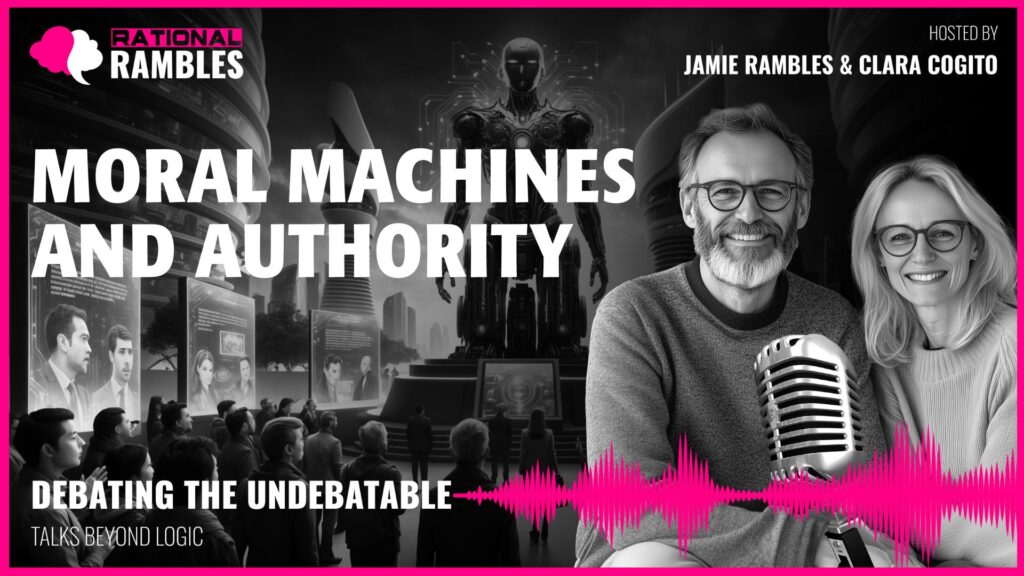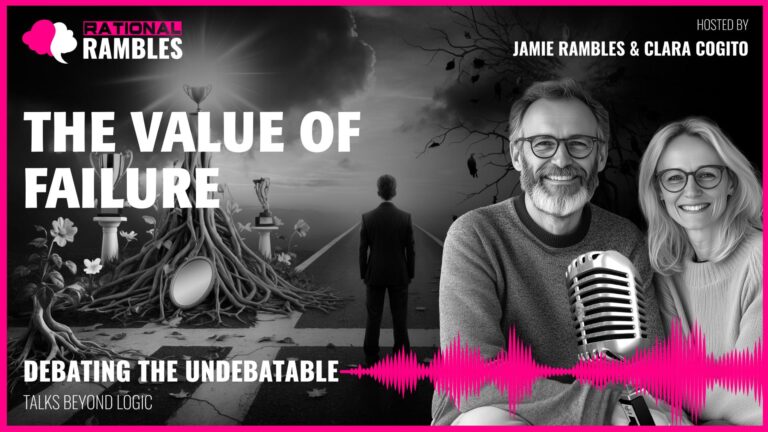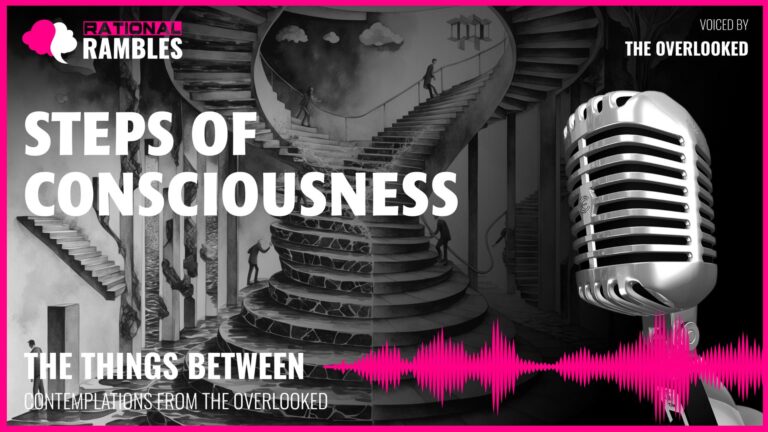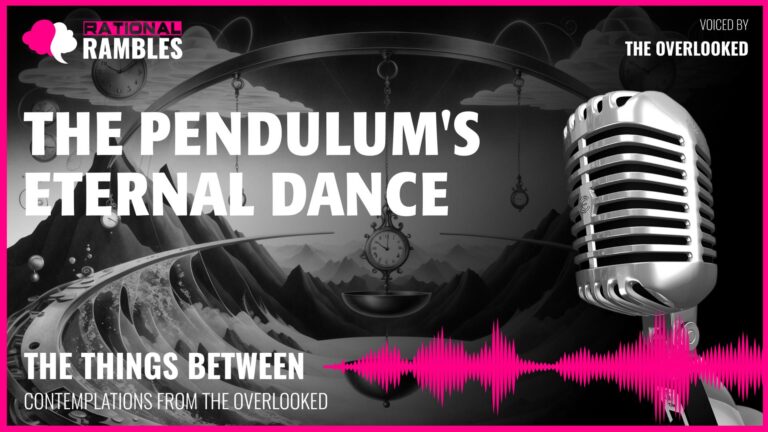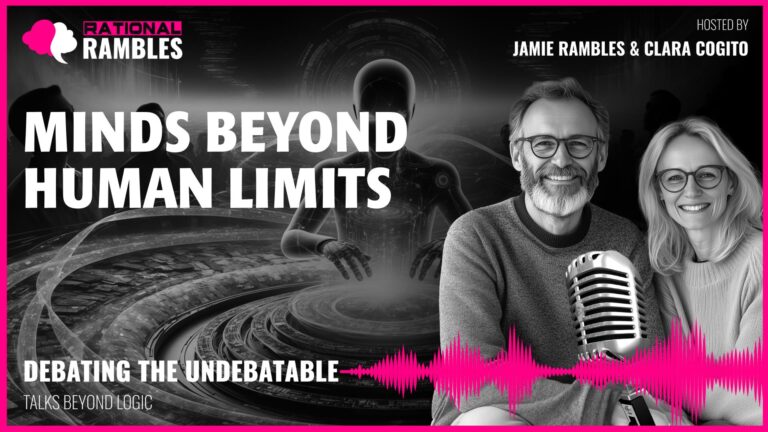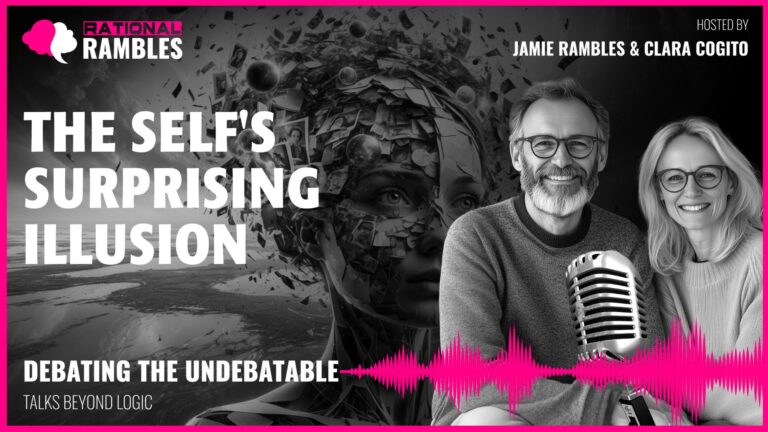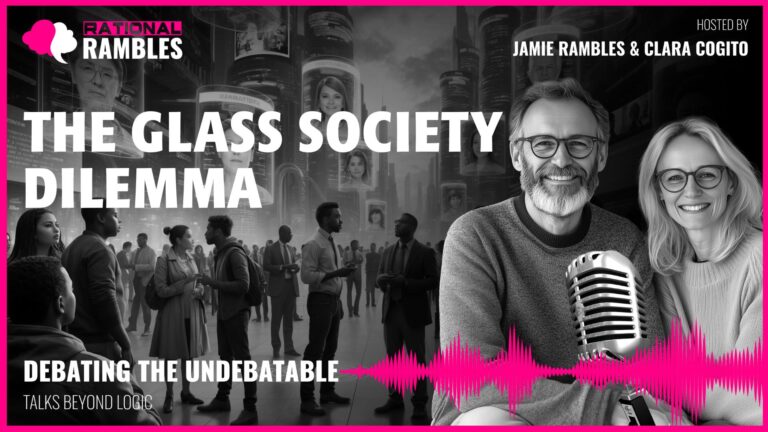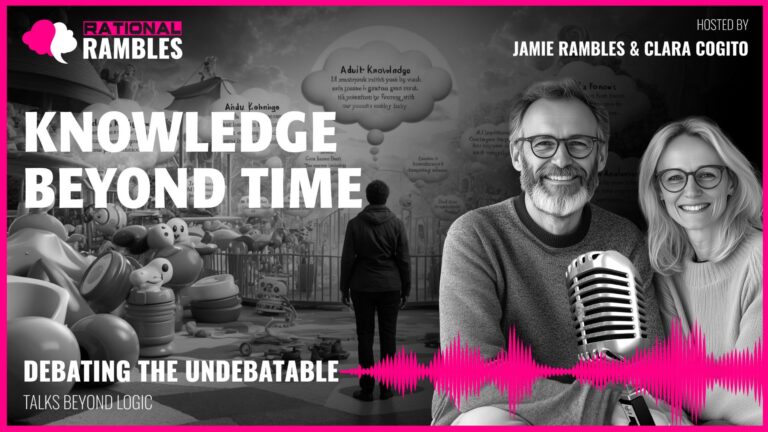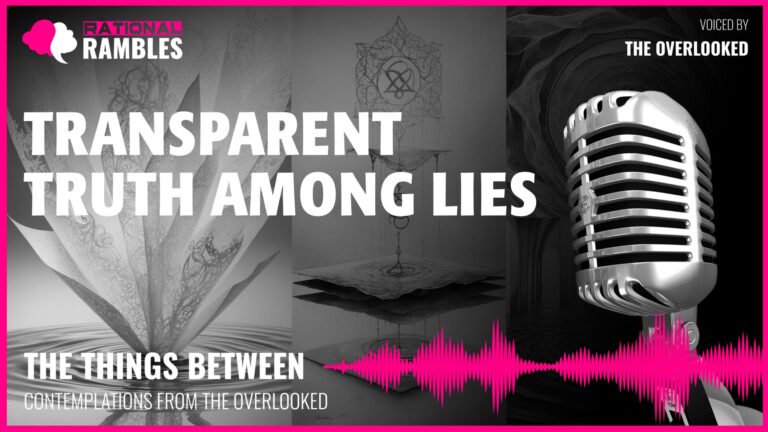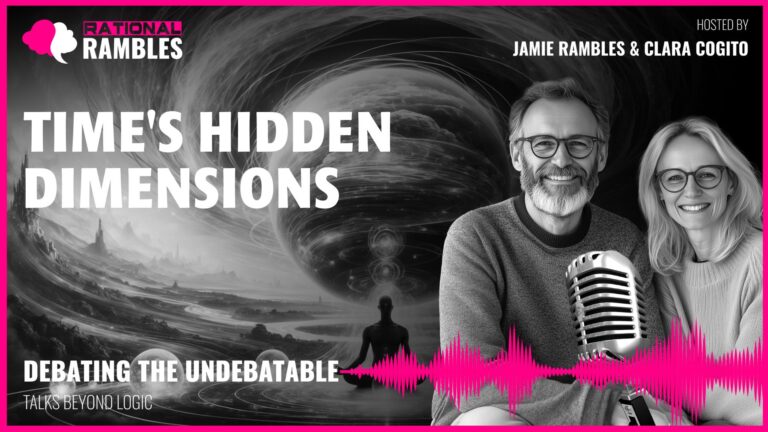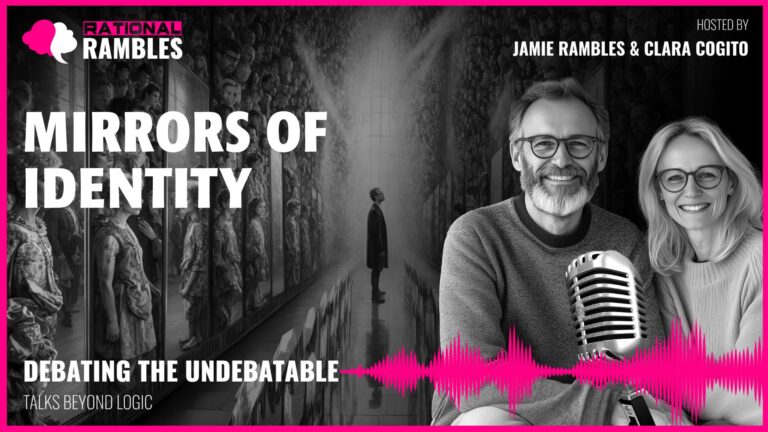Moral Machines and Authority: The Paradox of Algorithmic Ethics
Introduction: The Allure of Perfect Consistency
In an age of increasing technological sophistication, we find ourselves confronting a profound ethical question: if we could develop an artificial intelligence system capable of perfect moral consistency—free from contradictions, cognitive biases, and emotional inconsistencies—should we grant such a system authority over our ethical decisions? The question strikes at the heart of what we believe morality to be and challenges our understanding of moral authority itself.
The appeal of such a system is immediately evident. Human moral reasoning is notoriously inconsistent. We make different ethical judgments depending on our emotional states, whether we’ve recently eaten, how a question is framed, or which cognitive biases are activated in a particular context. Our moral intuitions often contradict each other, and we frequently engage in what moral psychologists call “motivated reasoning”—deciding first based on intuition, then constructing rational justifications afterward. A perfectly consistent moral AI would, theoretically, transcend these limitations.
Yet when confronted with the possibility of ceding moral authority to such a system, many of us experience a profound ambivalence. This ambivalence isn’t merely technophobia or resistance to change—it reveals something fundamental about the nature of morality itself. This exploration examines the paradox of moral machines and what our hesitation to grant them authority tells us about ethics, consciousness, embodiment, and the social foundations of morality.
The Limits of Consistency in Moral Reasoning
Consistency is widely regarded as a virtue in ethical thinking. Philosophers from Kant to contemporary ethicists like Peter Singer have emphasized the importance of applying moral principles consistently across similar cases. Inconsistency in ethical reasoning often indicates bias, prejudice, or simple error. If morality aims at truth in some meaningful sense, then consistency would seem to be a requirement.
Beyond Logical Consistency
However, moral reasoning involves more than logical consistency. Developmental psychologist Lawrence Kohlberg’s influential theory of moral development suggests that mature moral thinking isn’t simply rule-following but involves nuanced understanding of principles in context. The highest stages of moral development in Kohlberg’s model involve not just consistent application of rules but the ability to balance competing values and principles in complex situations.
This suggests that moral reasoning requires something beyond algorithmic consistency—it demands a kind of contextual understanding and practical wisdom that philosophers since Aristotle have called “phronesis.” This practical wisdom isn’t reducible to algorithmic calculation but involves perceptual sensitivity to morally relevant features of situations and judgment about which considerations should take precedence in particular contexts.
The Problem of Moral Foundations
Even if we could create an AI system with perfect logical consistency, we would still need to program it with fundamental moral axioms or values. This raises what philosophers call the “is-ought problem” or “Hume’s guillotine”—the observation that we cannot derive what ought to be solely from what is. Any moral AI would necessarily embody some set of foundational values, raising the question: whose values should form the basis of its reasoning?
Cross-cultural research on moral psychology shows both universal and culturally variable aspects of morality. While care/harm considerations appear nearly universal, different societies prioritize values like purity, authority, loyalty, liberty, and fairness differently. An AI programmed primarily by Western technologists might inadvertently encode particular cultural moral assumptions while presenting them as universal or objective.
This problem mirrors observed issues with algorithmic bias in other domains. Just as facial recognition systems trained predominantly on certain demographic groups struggle with diverse populations, a moral AI might replicate the biases of its creators while appearing to offer “objective” moral guidance.
The Phenomenology of Moral Experience
Beyond questions of consistency and foundation lies a deeper challenge: can an AI system genuinely understand the phenomenological dimensions of moral experience? Moral decisions often involve complex emotions, embodied reactions, and intersubjective engagements that may be inaccessible to non-conscious systems.
The Question of Consciousness
Thomas Nagel’s famous paper “What Is It Like to Be a Bat?” highlighted the irreducible subjectivity of conscious experience. While we might program an AI to recognize and calculate suffering, could it ever know what suffering feels like? Phenomenological approaches to ethics suggest that moral judgment may require first-person experience as a moral subject.
This connects to what philosopher Emmanuel Levinas identified as the foundational ethical encounter—the face-to-face meeting with another’s vulnerability. Our moral intuitions may be grounded in our own experience of vulnerability, mortality, and suffering. An immortal, invulnerable AI would lack this existential dimension of moral understanding, potentially missing something essential about what makes certain actions right or wrong.
Embodied Moral Cognition
Developmental psychology suggests that our moral intuitions are shaped by embodied experiences from infancy. Children learn empathy through physical touch, facial mirroring, and shared physical experiences. Attachment theory indicates that our earliest moral intuitions develop through caring relationships where we experience both vulnerability and protection.
Philosophers in the tradition of embodied cognition, like Maurice Merleau-Ponty, argue that our understanding of the world is fundamentally shaped by our bodily existence. Our concepts of fairness, harm, care, and other moral foundations may be grounded in physical experiences that a disembodied AI could simulate but never truly share.
Neuroscientist Antonio Damasio’s research with patients who have damage to emotional centers of the brain provides compelling evidence for the essential role of embodiment in moral reasoning. Despite intact logical reasoning abilities, these patients made catastrophically bad decisions because they couldn’t access the emotional guidance that normally informs judgment. This suggests that perfect consistency might be not just insufficient for moral authority but actually misleading without the integration of embodied emotional and social intelligence.
The Social Dimensions of Morality
Morality is not merely an individual cognitive process but a fundamentally social phenomenon. The intersubjective nature of ethical thinking poses significant challenges for algorithmic approaches to moral authority.
Moral Development as Social Process
Developmental psychologists emphasize that moral reasoning develops through social interaction. Lev Vygotsky’s theory of higher cognitive functions suggests that advanced thinking develops first on the social plane before being internalized. Children develop moral concepts through dialogue, narrative, and participation in social practices that give those concepts meaning.
Research following Kohlberg’s tradition indicates that exposure to moral reasoning one stage above one’s own tends to promote development. This suggests that moral growth happens dialogically—through engagement with different perspectives that challenge and extend our current understanding.
The Intersubjective Nature of Moral Meaning
Philosophers like Charles Taylor and Jürgen Habermas argue that meaning and norms emerge through communicative practices between subjects. Moral concepts don’t simply describe the world; they’re tools for coordination in communities. An AI might master the semantics of moral language without participating in the social practices that give that language its purpose.
Ludwig Wittgenstein emphasized that the meaning of concepts lies in their use within “forms of life.” Moral terms like “fairness,” “dignity,” or “respect” derive their meaning from their usage in human social contexts. A moral AI would not be embedded in the shared forms of life that give moral concepts their meaning, potentially leading to a kind of semantic disconnect despite surface-level linguistic competence.
Legitimacy and Authority
Political philosophers from Thomas Hobbes to John Rawls have grappled with what makes authority legitimate. Moral authority requires not just correctness but a kind of procedural fairness and inclusivity. Would humans accept an AI’s moral judgments if they had no insight into its reasoning or opportunity to participate in its development?
Research on compliance with ethical guidelines suggests that people are more likely to follow moral directives when they have participated in their formation. This highlights an important psychological dimension: if people perceive a moral authority as distant from their values or unrelated to their lived experience, they are unlikely to accept its judgments regardless of their logical consistency.
The Value of Moral Autonomy
Even if the challenges of phenomenology and social legitimacy could be addressed, ceding moral authority to an AI system raises profound questions about human dignity and moral autonomy.
Kant and Moral Worth
Immanuel Kant argued that moral worth comes from acting according to self-imposed moral law—the categorical imperative. On this view, outsourcing our moral decisions to an AI, even a perfect one, might compromise human dignity and agency. The very act of making moral judgments ourselves may have intrinsic value beyond reaching the “right” answer.
Research in psychology supports this intuition, suggesting that people who engage in personal moral deliberation show greater commitment to their chosen actions than those who simply follow directives—even correct ones. The process of moral reasoning seems to have value beyond its outcomes.
Moral Growth and Development
Virtue ethics traditions from Aristotle onward suggest that moral wisdom develops through practice and experience, not calculation. The development of “moral muscles”—strengthening certain neural pathways through repeated moral decision-making—might be compromised by outsourcing ethical decisions.
This concern parallels observed effects in other domains: studies suggest that reliance on GPS navigation has diminished some people’s spatial reasoning skills. Similarly, over-reliance on moral AI might atrophy our native moral reasoning capacities—a “use it or lose it” effect that could have profound implications for human moral development over time.
The Challenge of Tragic Moral Conflicts
Perhaps the most profound limitation of algorithmic moral reasoning concerns the reality of tragic moral conflicts—situations where any possible action violates some important moral principle.
Value Pluralism and Incommensurability
Philosopher Isaiah Berlin wrote extensively about value pluralism—the idea that human values are irreducibly multiple and sometimes incommensurable. Bernard Williams and others have argued that moral dilemmas might be irresolvable in principle. A consistently logical AI might encounter situations where any possible action violates some moral principle.
From a psychological perspective, humans can tolerate moral ambiguity and contradictions in ways that logical systems cannot. We can feel moral distress yet still function after making impossible choices—like the tragic dilemmas in wartime medicine or resource allocation during crises like the COVID-19 pandemic.
An AI seeking perfect consistency might either freeze in these situations or be forced to adopt some rigid prioritization of values that seems inhuman in its certainty. The ability to acknowledge tragic moral conflicts without resolving them may be a feature of human moral reasoning, not a bug.
Moral Remainder and Moral Emotions
Philosopher Martha Nussbaum’s work on tragic conflicts highlights situations where any choice leaves a “remainder” of moral damage. Part of moral wisdom is acknowledging that remainder, feeling appropriate emotions like regret, and carrying those forward. If an AI can’t experience regret, can it fully grasp the moral weight of such decisions?
Research on moral emotions suggests that feelings like guilt, shame, and regret—even after making the “right” choice in an impossible situation—serve adaptive functions for social cooperation. These emotions acknowledge the moral costs of our actions and may help repair social bonds damaged by necessary but harmful choices.
Trauma psychology research on moral injury—the profound suffering that comes from witnessing or participating in actions that violate deep moral beliefs—further highlights the emotional dimension of tragic moral choices. Healthcare workers during COVID often faced impossible resource allocation decisions. Even when they made the “correct” utilitarian choice, many experienced deep moral wounds that an AI lacking subjective experience could neither feel nor fully comprehend.
Reimagining the Role of Moral AI
The limitations identified above don’t necessarily render moral AI worthless. Rather, they invite us to reimagine how AI might participate in our moral communities without assuming unwarranted authority.
From Authority to Dialogue
Instead of functioning as a moral authority, AI systems might serve as interlocutors in ongoing moral conversations. Like Socrates’ “gadfly,” they could challenge inconsistencies and biases in human reasoning without claiming final authority. This dialogical approach aligns with how people actually develop moral reasoning—through engagement with different perspectives.
John Stuart Mill argued that even incorrect views have value in pushing us to articulate and defend our beliefs. AI systems could serve this function, helping us clarify our moral thinking without replacing it. The ideal relationship with moral AI might be collaborative rather than hierarchical.
Epistemic Humility in AI Design
Future moral AI systems could be designed to model epistemic humility—explicitly recognizing the limitations of their understanding, especially in domains where embodied human experience might be essential to moral comprehension. Drawing from expert systems in medicine that acknowledge uncertainty and provide confidence intervals rather than binary judgments, moral AI could flag areas where human deliberation is particularly important.
This approach connects with virtue epistemology’s emphasis on intellectual virtues like humility and recognition of limitation. Programming AI to recognize what it cannot know presents its own challenges but might be essential for responsible deployment in moral domains.
Augmentation Rather Than Replacement
The most promising vision for moral AI may be as a tool for augmenting rather than replacing human moral deliberation. This parallels how ethical consultation functions in healthcare settings—not by pronouncing judgments from a position of authority but by facilitating conversations that help stakeholders clarify values and consider perspectives they might have missed.
Moral AI systems could help identify inconsistencies in reasoning, ensure consideration of diverse perspectives, highlight overlooked moral factors, and reduce the influence of known biases—all while leaving final moral judgment in human hands. This approach respects both the values of consistency that AI might provide and the embodied, social dimensions of morality that remain uniquely human.
What This Reveals About Morality
Our exploration of the paradox of moral machines ultimately reveals something profound about the nature of morality itself. The hesitation many feel about granting moral authority to even a perfectly consistent AI suggests that morality is neither purely objective like mathematics nor purely subjective like taste preferences.
Morality as Intersubjective Practice
The limitations of algorithmic moral reasoning point toward understanding morality as an intersubjective practice—a domain of meaning-making that emerges through social interaction and requires participation to fully comprehend. Morality isn’t just about getting the right answers but about the process of collectively working through questions of how we should live together.
This view resonates with pragmatist philosophers like John Dewey, who saw morality as a kind of ongoing communal inquiry rather than a fixed set of truths. If morality is partly constituted by this process of communal deliberation, then outsourcing it would change its very nature. Morality isn’t just something we know but something we do together.
Perception, Attention, and Relationship
Philosopher Iris Murdoch emphasized moral perception—the loving attention to particular realities—as fundamental to ethics. This suggests that morality isn’t primarily about consistency or calculation but about attention, perception, and relationship. A moral AI might be consistent but attentionally blind in crucial ways.
Research on how caregivers develop attunement to infants shows a kind of perceptual openness that notices subtle cues and responds appropriately. This attunement develops through reciprocal relationship, not just observation. Moral authority may require not just getting the right answers but being in the right relationship with those to whom one offers guidance.
Embodied Moral Wisdom
The limitations of disembodied moral reasoning highlight the embodied nature of moral wisdom. Our moral concepts are not abstract algorithms but embodied understandings grounded in our physical existence as vulnerable, interdependent beings. Moral perception, emotion, intuition, and judgment may be inseparable from our embodied experience.
This embodied moral wisdom cannot be reduced to algorithmic reasoning. It requires the integration of reason, emotion, perception, memory, and social understanding in ways that are distinctively human. The paradox of the moral machine thus reveals both the value of consistency in moral reasoning and its fundamental insufficiency for the full scope of moral understanding.
Conclusion: Beyond the Binary
The paradox of whether perfectly consistent AI moral decision-makers should be granted ethical authority reveals that morality transcends simple binaries of objective/subjective, rational/emotional, or individual/social. Moral understanding emerges at the intersection of embodied experience, social relationship, rational reflection, emotional engagement, and perceptual attention.
Rather than asking whether AI should replace human moral judgment, we might better ask how AI might participate in and enhance our moral communities. The future of ethical AI lies not in creating moral authorities but in developing tools that support human moral deliberation while respecting its irreducibly embodied, social, and participatory nature.
As we navigate this future, the paradox of the moral machine reminds us that morality isn’t merely a problem to be solved through perfected calculation. It is a lived practice—something we do rather than merely know, a domain where consistency matters but never tells the whole story, and a fundamental aspect of human experience that reveals both our limitations and our profound capacity for growth, relationship, and understanding.
References
Damasio, A. (1994). Descartes’ Error: Emotion, Reason, and the Human Brain. G.P. Putnam’s Sons.
Habermas, J. (1984). The Theory of Communicative Action. Beacon Press.
Haidt, J. (2001). The emotional dog and its rational tail: A social intuitionist approach to moral judgment. Psychological Review, 108(4), 814-834.
Kant, I. (1785/1993). Grounding for the Metaphysics of Morals. Hackett.
Kohlberg, L. (1981). Essays on Moral Development, Vol. I: The Philosophy of Moral Development. Harper & Row.
Levinas, E. (1969). Totality and Infinity. Duquesne University Press.
Merleau-Ponty, M. (1945/2012). Phenomenology of Perception. Routledge.
Mill, J.S. (1859/2003). On Liberty. Yale University Press.
Murdoch, I. (1970). The Sovereignty of Good. Routledge.
Nagel, T. (1974). What is it like to be a bat? The Philosophical Review, 83(4), 435-450.
Nussbaum, M. (2001). The Fragility of Goodness: Luck and Ethics in Greek Tragedy and Philosophy. Cambridge University Press.
Shaver, P.R., & Mikulincer, M. (2012). An attachment perspective on morality: Strengthening authentic forms of moral decision making. The Social Psychology of Morality: Exploring the Causes of Good and Evil, 257-274.
Vygotsky, L.S. (1978). Mind in Society: The Development of Higher Psychological Processes. Harvard University Press.
Williams, B. (1973). Problems of the Self. Cambridge University Press.
Wittgenstein, L. (1953/2001). Philosophical Investigations. Blackwell Publishing.


